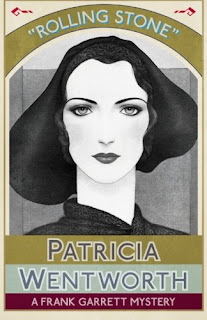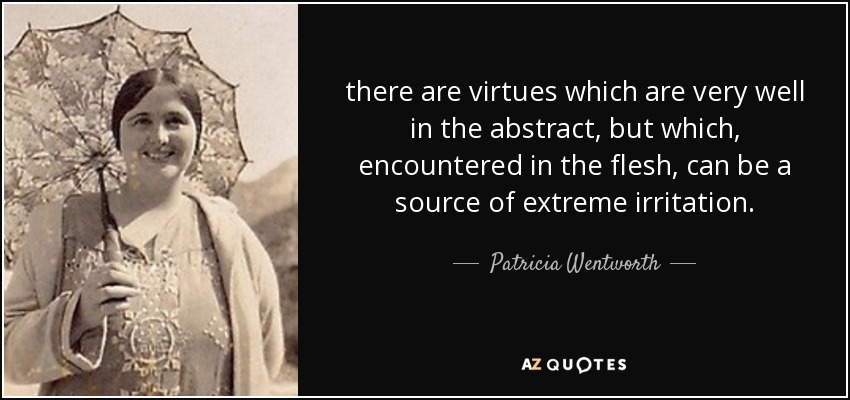Peter
Talbot is a novelist whose cousin is Col. Frank Garrett, head of the
British Foreign Service and a damned negligent fool who should be
horsewhipped for it. It's 1940, or thereabouts, world war is raging
in Europe, and Garrett has assigned Talbot to spy on the most
dangerous international criminals not wearing swastikas.
Here's
Patricia Wentworth telling us in her novel, Rolling
Stone,
how this damned fool escapade came about:
Talbot "had
been roped in because he had stumbled on something odd, and because
he wasn’t a regular agent. The novelist is a privileged Nosey
Parker. It is his job to watch people and listen to them. It flatters
some, and flutters some but no one suspects him of being in with
Scotland Yard or the Foreign Office."
Oh yeah?
When Talbot tells his cousin
what he's stumbled onto, Garrett explodes.
“'Good
Lord!' in a voice exactly like the terrier’s bark." All he'd
heard was the name Maude Millicent.
“'Who is
the lady— an old flame?'
"Garrett used a
regrettable expression about Maud Millicent Simpson.
“'She’s
beaten me twice, and I suppose she thinks she can do it again.”
“Who is
she?”
Garrett showed his teeth.
“'Maud
Millicent Deane—that’s how she started—parson’s daughter, and
the cleverest criminal alive. She worked with the Vulture, and when
we got him, she carried on with what was left of the organization...
"'If
she’s in this business, she won’t get away again if I can help
it. But if she’s in it, you’re up against something—all of us
are. She can write any hand, use any voice, impersonate a dozen
different types..." And she murders quickly and easily as
swatting a fly.
What a
laugh. "If I
can help it...you're
up against something—all
of us are."
Garrett
never leaves his office, or his home or club or wherever he hangs
out. Talbot's strictly on his own. And apparently he's working for
free! In Brussels, after stumbling onto the fringe gang member
Garrett had suggested he keep an eye out for, he notifies Garrett by
letter and adds, "If I fall a victim to dirt, drains or bugs, I
presume that a grateful government will pay for my obsequies."
Gadzooks,
the lad's on the trail of a monster too hideous for James Bond, and
doesn't even have an expense account or a license to lie!
But Talbot
is smart, bold, and resourceful. He finds the fringe gang member
dying in a hotel room, switches passports with him and proceeds to
carry out the now dead man's mission, which takes him home to London.
How conveeeen-yent as Church Lady would say. But so what, as I and
Yvette
Banek
would say, he and we are off on one helluva fine, heart stopping,
heart melting romp, with murders and burglaries and midnight romances
and...oh, I think I am about to feel verklempt! (I'd be fanning
myself and advising you to talk amongst yourselves, but that's a tale
of another horse, as my dad loved to say, the pun of which I just now
after all these oblivious years have finally gotten).
I forgot to
add "laughs" as one of the features. Wentworth provokes
many of them unintentionally, I suspect, with British words and
expressions that made me wonder if Mick Jagger hadn’t dictated the
novel—or his dad or grandpa, more plausibly. But here's one I think
Wentworth made up all herself:
On
his way to carry out a presumably Maud Millicent Simpson-ordered
burglary in his voluntary undercover role, Talbot says to himself,
"It would be bad enough to lurk burglariously
about Heathacres in the dark, but a very bright full moon would
impart an indecent air of melodrama to the proceedings."
I doubt
Mick Jagger or his ancestors would say or have said "burglariously"
in any context, but it does sort of roll the Rolling
Stone
narrative along with a hint of hilarity, what?
The
romance? There's really only one. Potentially requited one, that is.
It involves lovely young Theresa "Terry" Clive, who
witnesses two felonies at the Heathacres estate, where's she's
staying as a guest and being courted by a least one other guest.
First she sees another guest sneak out at night and slip her
hostess's string of pearls to a man she thinks is her boyfriend
hidden in the bushes (Of course it's really Talbot lurking
burglariously about). Terry sees him take the pearls, comes out in
her nightgown, scolds him and takes the pearls back, returning them
to her sleeping hostess's room. Talbot, of course, is smitten.
Terry next
sees a mysterious shadowy form step out onto a balcony and break a
window, then slip back inside. Talbot knows this is his cue. He
approaches the broken window, and receives a rolled up valuable
painting the shadowy form thrusts through the broken window. Talbot
puts the painting into the trunk of his rented car and hightails it
out of Dodge.
Things now
really get hairy. Talbot figures he's being set up as a fall-guy to
take the rap for an earlier painting theft in which a butler who
interrupted the theft was fatally shot. He doesn't get much
encouragement from his cousin in this dilemma. The Foreign Service
chief doesn't do much for me, either. Here's Wentworth's description:
"Colonel
Garrett
sat at an office table and drove a spluttering pen. He was a little
sandy man with bottle-brush hair and small grey eyes which could
sharpen until they looked like two points of polished steel."
I've never especially liked
little sandy men with bottle-brush hair, but I can't really tell you
why (If I did I'd hafta—oh, pfui).
Rolling
Stone
is billed as the second (and final) novel in the "Col. Garrett
series" in Wentworth's canon, but why it’s called the "Col.
Garrett series" is a bigger mystery than who stole the painting
from Heathacres. Garrett’s presence in both novels credited to
him—Rolling
Stone
and Dead
or Alive
is similar to that of the character “M” in Ian Fleming’s James
Bond series. He sits back, bullies people, and lets others do the
work and take the risks. I found an online claim that he was supposed
to be the one working undercover in Rolling
Stone.
Not that this flummery was in the least regrettable. Peter Talbot did
an admirable job, as did Bill Coverdale in Dead
or Alive.
Garrett evidently appears in at least two other Wentworth novels, in
his similar stay-at-home bullyboy head-honcho role:
Walk
With Care
and Danger
is Calling,
both part of the much earlier (1931 and 1933) “Benbow Smith”
series. I might give them a looksee. Wentworth’s most famous (and
much lengthier) series features a sleuth called “Miss Silver,” [thanks, Marty] of
which I am not much inclined to check out.
Then
again, Yvette Banek’s delightful reviews are very persuasive.
 |
| Wentworth |
[For
more Friday's Forgotten Books check the links on Patti
Abbott's unforgettable blog]



That's "Miss Silver" not "Miss Smith"! Her first name is also Maud. If she had turned to crime she would have been a master criminal too. But very old-fashioned.
ReplyDeleteThanks, Marty. Must've been a brain fart. Maybe I will check out Maude Silver!
DeleteI definitely will be wanting to read this one, Matthew. I love this sort of stuff and I did find your quotes from the book extremely enticing - that's the kind of language I love. Ha. These days, I find I am hiding out in the past via these sorts of books, I've even begun rereading my stashes of, not only Wentworth, but Inness and MacDonald and Christie and Stout and Allingham and all the other Golden Agers who made life tolerable back in the day when honor was held to be an admirable human trait. Know what I mean?
ReplyDeleteI read FOOL ERRANT by Wentworth which was a very enjoyable Benbow Smith book. So I'd read that one first since I haven't read the two you mentioned and therefore don't know if they're any fun. :)
P.S. Don't forget to read HIDE MY EYES by Margery Allingham. I did give it five stars. Since you seem to be in a mood to read the sorts of things I've been recommending lately. :)
ReplyDeleteThanks for the tips, Yvette. I'll check them out. For next week I'm reading The Case of the Poisoned Eclairs by Howard Fast, inspired by Tracy's review of one of his book this week. And I missed you this week!
DeleteOkey doke, I've just downloaded Hide My Eyes (even tho I'm averse to serial killer novels--I'm trusting you, Yvette!)
DeleteAh, I missed this post. Work has been bad and when that happens I can't keep up with anything else very well. I have never read a book by Patricia Wentworth without Miss Silver in it, but I did buy one of those last year so maybe I will get around to it soon. As always, your review is very entertaining.
ReplyDeleteThanks, Tracy. Now I'm gonna hafta read a "Miss Silver" novel!
Delete